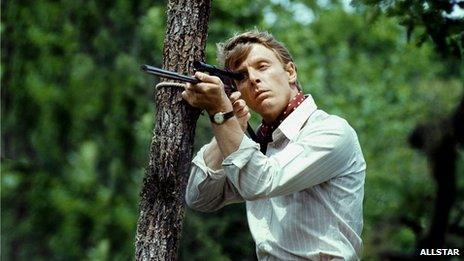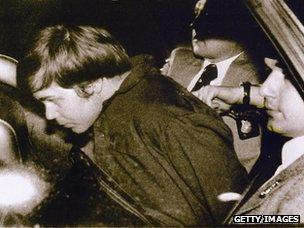The spectre of the lone gunman
- Published

Two hundred years ago, an assassin gunned down Prime Minister Spencer Perceval in the House of Commons. His death ushered in a threat that security services have struggled to deal with ever since - the lone gunman.
The killer stepped in front of the prime minister, blocking his path. Then John Bellingham stretched out his arm, pressed a pistol to the leader's chest and pulled the trigger.
Bellingham was a disgruntled merchant. The death of his victim, Spencer Perceval, on 11 May 1812 in the House of Commons was the only occasion on which a British premier was assassinated.
But the murder set a grim template over the following two centuries for a series of lone gunmen who attempted to further their own views by picking up a firearm and training it on their nation's ruler.
In the century after 1865, four US presidents died in such a manner. Although not technically a lone gunman, Gavrilo Princip altered the course of Western history by assassinating Archduke Franz Ferdinand in 1914. It was an event that sparked World War I.
The lives of Israeli Prime Minister Yitzhak Rabin, US civil rights leader Martin Luther King and Swedish premier Olof Palme were all cut short by a gun-wielding individual, as was that of Indian leader and activist Mohandas Gandhi.
Perceval was not, of course, the first ruler to die at the hands of an assassin. Shakespeare immortalised the conspiracy that led to the stabbing to death of Julius Caesar.
Numerous other emperors and kings met their deaths in a similar fashion. But they usually fell at the hands of someone with privileged access - a member of the inner circle.
Nor was Perceval the first leader to die from an assassin's gunshot. The first Earl of Moray, Scotland's regent, is thought by historians to be the first head of state to have been killed by a firearm, in 1570.
But Perceval's death came at a watershed moment. Advances in breech-loading and flintlock technology in the 18th and 19th Centuries made the task of assassination far easier.
Unlike in the days when Roman conspirators had to get close enough to Caesar to stab him to death, the advent of the rifle meant loyal bodyguards were no longer a guarantee of safety.
And Bellingham can, like Princip and John F Kennedy's assassin Lee Harvey Oswald, be seen as a dark manifestation of the age of the individual.
"Bellingham was quite an intense character, he was an obsessive," says historian Andro Linklater, author of Why Spencer Perceval Had to Die. "He craved respectability. He was wrong-headed but logical.
"It's a very modern personality type - that curiously cold, obsessive, self-obsessed view of the world."
In this vein it's possible to view the rise of the lone gunman - inspired by the 19th Century anarchist, proto-terrorist doctrine of the "propaganda of the deed" - as a perverse counterpoint to the steady growth of democracy across the West during the same period.
Just as ordinary citizens were winning the right to make their voice heard by their rulers, so too deranged loners had an opportunity to target the most powerful in society thanks to the accuracy of the rifle.
As democratic elections made it important for leaders to be able to go out among their electorates, the rise of accurate, deadly firearms gave those same leaders pause for thought.
The likes of Bellingham and Oswald - and those categorised as "spree killers" like Anders Behring Breivik - have always had a key tactical advantage.
While terrorist networks and conspiracies can be infiltrated, the solitary gunman with a grudge cannot - and authorities face the challenge of spotting them in the first place.
According to former Special Branch counter-terrorist detective David Lowe, now an expert in crime and security at Liverpool John Moores University, this fact alone makes them, in several key respects, more dangerous.
"If you don't have intelligence, the only way you can tackle the threat is constant surveillance," he warns.
"It's all about trying to spot this individual - keeping a watching brief for that one person who isn't behaving as everyone else is. Ultimately, you need an element of luck."
Consequently, the fear that such individuals could strike at any time has remained widespread.
In the era of the lone assassin, politicians' capacity to interact with the public they are supposed to represent is curtailed by the requirements of security and surveillance - a phenomenon given no better expression than the Popemobile, the bulletproof vehicle designed to shield the Pope from attack.

John Hinckley attempted to assassinate US President Ronald Reagan in 1981
This sense of unease is one that popular culture has proved adept at exploiting.
Wolfgang Petersen's celebrated film In The Line of Fire - which pitted John Malkovich's deranged yet clinical gunman against Clint Eastwood's Secret Service agent - demonstrated how fresh the trauma of Kennedy's assassination remained 30 years on.
Even more enduring is Frederick Forsyth's 1971 novel The Day of the Jackal, subsequently turned into a film starring Edward Fox as the mysterious Englishman hired to kill the French president.
As he wrote the book, Forsyth envisioned readers would identify with his detective hero. But the author found, instead, the assassin's allure as a kind of anti-James Bond was far greater.
"I thought I'd created a big, bad villain in the Jackal," Forsyth says. "But when it came out, of course, no-one wanted to know about the nice, soft, gentle policeman. Everybody watching the film is gunning for Edward Fox."
The reality of gunmen like Oswald or Robert Kennedy's killer Sirhan Sirhan is far less glamorous. It can be hard to believe that these unremarkable people were able to accomplish the assassination of a closely guarded person.
Little wonder then that conspiracy theories about assassinations have been so enduring given the shockwaves they have inflicted.
"You can see the attraction of a better explanation than some pathetic character like Oswald having killed the president," says Sir Adam Roberts, emeritus professor of international relations at Oxford University and president of the British Academy. "It's difficult to accept that history is chaotic."
If there is any consolation to be had, Roberts believes, it is the lack of success they have at fulfilling their stated goals.
"I would say they almost never achieved their objectives," he says. "Gavrilo Princip started World War I, but he didn't intend to; he just wanted to kill an archduke. He couldn't believe the mass carnage that had been caused by his act."
Lone gunmen, he adds, tend to share the mistaken belief that society's ills lie solely with the figurehead at the top.
"In fact tyranny, or whatever form of government you have, usually has a broader social basis. The idea that one cleansing act of violence will transform the political landscape has been disproved time and time again because it has messier results."
It's not a conclusion Bellingham, who was executed a week after Perceval's assassination, lived long enough to draw.
The aftershocks of the killing, however, are still being felt.